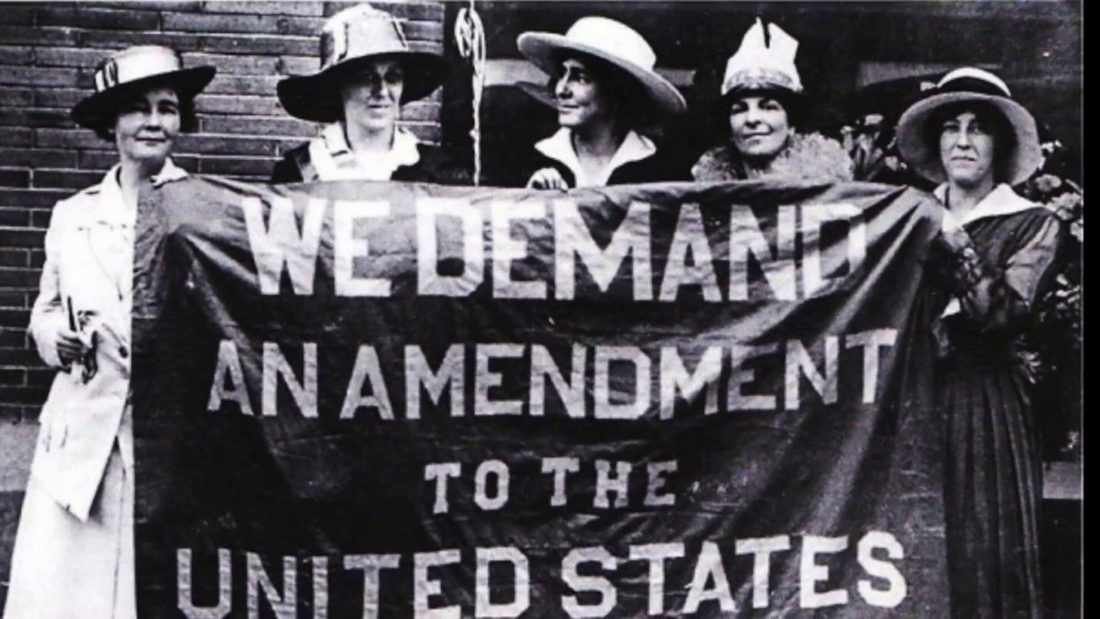102nd Anniversary of the 19th Amendment

102nd Anniversary of the 19th Amendment
On August 18, we recognize the 102nd Anniversary of the ratification of the Amendment confirming the right of women to vote:
The right of citizens of the United States to vote shall not be denied or abridged by the United States or by any State on account of sex.
Congress shall have power to enforce this article by appropriate legislation.
As with most things in the new Republic, each State defined its own rules and qualifications for voting. Most states had a requirement that only land owners were eligible to vote. This was a simple way to ensure that those who had a vested interest in the activity of the State could vote. According to scholars at the National Constitution Center, as early as 1776, New Jersey's constitution allowed women to vote as members of "all inhabitants" of the State. After accusations of fraudulent voting by "men dressed as women," New Jersey revised its voting requirements in 1807, restricting the voting population to men only.
After the ratification of the Constitution and during the first half of the 1800's, the United States expanded, purchasing the territory of Louisiana from France, annexing the Republic of Texas, eventually admitting 16 States (including Illinois in 1818!) into the Union by 1848. At the same time, States were making it easier to vote, notably removing the land ownership requirement.
The Woman's Rights Convention at Seneca Falls, held in 1848, was the start of the modern American women's rights movement. The first day, around 300 women gathered in the Wesleyan Chapel in Seneca Falls, New York to "discuss the social; civil and religious condition and rights of Woman." Elizabeth Cady Stanton --an active abolitionist-- organized and provided the keynote of the Convention's first day. The second day was open to men as well and Fredrick Douglass spoke in favor of the goals of the Convention. During this second day, the Declaration of Sentiments was adopted by a majority of the Convention. In this Declaration, the women used the form of the Declaration of Independence to raise their grievances: being unable to vote, unable to hold property, mistreated in cases of divorce, unable to teach "theology, medicine, or law", unable to pursue a "thorough education", and excluded from "any public participation in the affairs of the Church."
Women would not see much come from this Declaration of Sentiments in the years after it was adopted. Abolitionists continued to seek the freedom of slaves and ending the institution of slavery, leading to the Civil War in 1861. After the Union defeated the Confederacy in 1865, the 13th, 14th, and 15th Amendments were ratified over the next five years, respectively prohibiting slavery within the United States, ensuring states cannot infringe on citizen's rights, and explicitly granting the right to vote to blacks and former slaves. In 1869, Wyoming Territory granted women age 21 and older, the right to vote. When it was admitted as a State in 1890, Wyoming's constitution was the first to allow women the right to vote. In 1870, Utah territory granted women the right to vote, however a Congressional act attempting to reduce the impact of Mormon theology within the territory repealed women's suffrage until Utah became a State. Colorado passed a referendum on universal suffrage in 1893, and Idaho passed a Women's Suffrage Amendment in 1896.
The temperance movement has a long history in the United States, but by the turn of the 19th Century, the Women's Rights movement had taken up the temperance cause, connecting alcohol and domestic violence. In January 1919, the 18th Amendment was ratified, abolishing "the manufacture, sale, or transportation of intoxicating liquors." This political victory combined with a growing number of states already granting women the vote, gave the Women's Suffrage movement the influence it needed to have Congress pass an Amendment securing the federal vote for women six months later. Illinois, Michigan, and Wisconsin were the first States to ratify the Amendment on June 10, 1919. On August 18, 1920, Tennessee became the 36th State to ratify it, making the 19th Amendment a part of our Constitution.
In 2022, the Republicans have several great women running to represent voters of St. Clair County Board District 2 and beyond: Cindi McDonald (St. Clair County Circuit Clerk); Jennifer Korte (112th Legislative); Ashley Hunsaker (113th Legislative); Erica Harriss (56th Senate); Shannon Teresi (Illinois Comptroller); Regan Deering (13th Congressional), and Kathy Salvi (US Senate). I have met most of these women in person and gotten to know a little of their own backgrounds. They are wives, mothers, entrepreneurs, and more! They have their own motivations in running for office but each one I have met value families, their communities, and the principles of our nation. They want to pass those values to the next generation, as well as a state and a country in which those values can be lived out.
